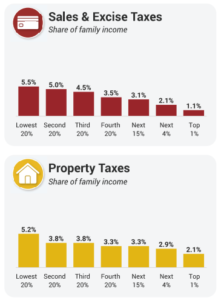As proposals emerge to meet the Governor’s goal of a 40% decrease in revenue generated from property taxes, let’s be clear that sales taxes are the most regressive tax category.

Policymakers, including Governor Pillen, have pointed to the regressivity of property taxes in discussing proposals to shift a portion of what’s currently paid to fund cities, counties and schools through property taxes to sales taxes. These proposals come less than a year after the Pillen administration supported sweeping income tax cuts that overwhelmingly benefited the wealthy and out-of-state corporations.
According to the Who Pays? report, the implications of those tax cuts will shift Nebraska’s tax system from 20th least regressive to 20th most regressive.
With hearings set to begin next week, senators have forwarded several proposals for consideration that could help thousands of households across Nebraska while not raising taxes on hard-working families when they must purchase a car, pick up school supplies or buy diapers.
LB 1367 would look at a taxpayer’s property taxes paid relative to their income, and several homestead exemption proposals have been introduced this year, including LB 924 which would expand the homestead exemption to those in qualified census tracts, LB 1041 which would expand eligibility for seniors, and LB 126 that expands the homestead exemption for disabled veterans and their spouses.
Other bills would propose to raise revenue and could potentially make Nebraska’s tax code more progressive, including LB 1279, which addresses unrealized capital gains, and LB 1354, which would broaden the sales tax base by removing an exemption on advertising purchases by large companies.
Over the coming days and weeks, OpenSky will be examining these proposals and others more closely and providing research and analysis to help policymakers to make informed decisions. A revenue system where everyone pays according to their ability is critical in creating opportunities for all Nebraskans.

